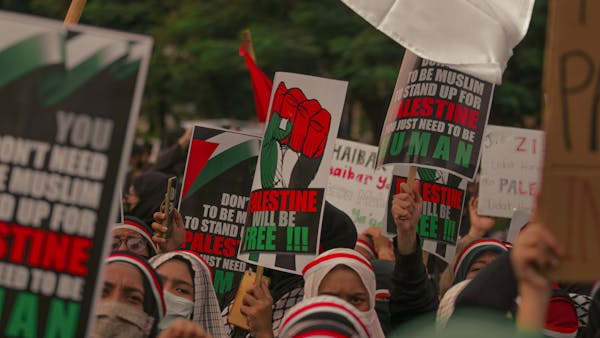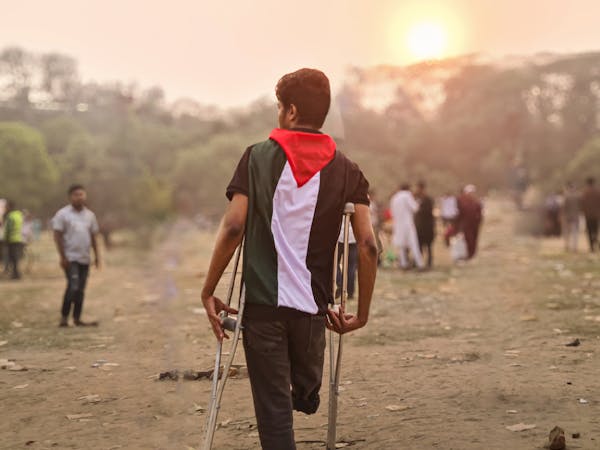Israel and Palestine: Living Between Rockets and Roots
You can’t understand what it’s like here unless you’ve walked these streets. The silence between the sirens, the prayers whispered behind locked doors, the news bulletins that feel personal—not because you read them, but because you hear them through the window. This land doesn’t just hold stories. It holds pain, resilience, roots—and rockets.
In this tiny strip of the world, people are born into history without asking for it. Babies take their first steps to the sound of drone surveillance. Grandparents bury their memories in stories they tell over tea, hoping someone—someday—will listen and not forget.
This is not just a war. It’s not a line drawn on a map. It’s a wound that keeps reopening.
When Home Feels Like a Battlefield
Mariam is 12. She lives in Khan Younis, a city in Gaza. Her bedroom wall has cracks from last year’s airstrikes. They patched it with leftover concrete. Her mother tells her not to sleep too close to the windows in case they shatter again. Mariam’s favorite toy is a pink rabbit missing one ear. She found it buried under rubble the day after their neighbor’s house was bombed.
Across the border, in Sderot, Daniel is 10. His school is only five minutes from his home, but there are ten bomb shelters along the way. His backpack holds crayons, a sandwich, and an emergency gas mask. His father shows him where to run if the sirens start mid-walk.
They’ve never met. But their fears are strangely the same.
What kind of world asks children to grow up like this?
Not Just News—It’s Tuesday
To the outside world, conflict means headlines, casualty counts, UN meetings. But here, war becomes your calendar. Ceasefires are treated like brief holidays. Parents plan weddings and funerals with one eye on the news. Everything is fragile. Nothing is certain.
A coffee shop opens in Ramallah. The owner, Sami, jokes, “It’ll stay open unless the road gets blocked again or my cousin gets arrested.” He laughs, but he’s serious. That’s life.
In Tel Aviv, beachgoers sip cold drinks as jets fly overhead. Some barely glance up. They’re used to it. Used to the fact that peace talks could collapse while they’re halfway through a beer.
People here live between rockets and roots. They build, they rebuild. They plant olive trees with hands that also dig graves.
Uprooted Generations
Ask someone in Gaza what “home” means, and they’ll describe a place their grandparents once lived. A house with a fig tree. A front door with chipped paint. Some still have the keys, rusted now, to houses they haven’t seen in 75 years.
Ask a Jewish Israeli whose parents came from Europe or Iraq, and they’ll tell you about persecution, about prayers whispered in fear. They’ll talk about coming to a place where, finally, they could exist as Jews—not guests, not exiles—but people with a land of their own.
They both believe in the justice of their cause.
They both cry for the same land.
They both lose sleep over the same soil.
The Checkpoint Doesn’t Care
At Qalandiya checkpoint, near Jerusalem, the air is thick. Not just with dust, but tension. Palestinians line up as early as 3 AM to cross into the city for work. A woman holds her child in one arm and an ID card in the other. A soldier, barely out of high school, checks it. His hands tremble, maybe from fear, maybe from fatigue.
Neither of them chose this.
He didn’t choose to be a soldier. She didn’t choose to be behind a wall.
But here they are, both caught in a system older than them. One holding a gun, the other holding a bag of groceries and a prayer that she won’t be late to her cleaning job again.
This is not about politics anymore. It’s about people who just want to go home at the end of the day without being dehumanized.
Jerusalem: Sacred and Scarred
Nowhere is the complexity more visible than in Jerusalem. The city breathes with history. Every stone tells a story. And yet, every street can be a dividing line.
In the Old City, Arab and Jewish shopkeepers greet each other in broken Hebrew and Arabic. Some smile. Some don’t. Suspicion hangs in the air, but so does a strange kind of co-existence. In one alley, you can smell za’atar, hear a rabbi’s chant, and catch a call to prayer—all within minutes.
And then a protest breaks out.
Stones are thrown. Soldiers arrive. And just like that, the fragile balance cracks again.
Jerusalem isn’t just holy. It’s haunted.
Grief Doesn’t Speak One Language
When a Palestinian boy dies, his mother wails in Arabic, collapses in the arms of neighbors, and buries her son in a white shroud. When an Israeli girl is killed by a rocket, her father clutches her photo, his hands shaking, sobbing in Hebrew.
Grief doesn’t need translation.
The language of loss is universal.
But somehow, in the rhetoric of war, one death is used to justify another. One tragedy is weaponized against the next.
What we forget is this: Every time someone dies, a family is shattered. And for what?
Land? Revenge? Fear?
No parent should ever have to bury their child for a cause they didn’t choose.
The Youth Who Dare to Hope
Despite everything, there are voices rising from the rubble—young voices, tired of hate.
In Bethlehem, Rana, a 22-year-old Palestinian woman, writes poetry about checkpoints, dreams, and freedom. Her words go viral online, despite internet blackouts.
In Haifa, Yoav, a 24-year-old Israeli activist, organizes joint protests with Arabs and Jews. He’s been arrested three times, but he still shows up.
They don’t want to erase history. They want to heal it.
They believe peace isn’t just possible—it’s necessary.
They speak softly, but they’re not weak.
They are the ones who might one day change the story.
What the World Gets Wrong
Most people watching this conflict from afar see it through screens—filtered by headlines, colored by bias, numbed by repetition.
But real life here is messy. It doesn’t fit into hashtags or talking points.
Not all Israelis support the occupation. Not all Palestinians support violence. Most people, on both sides, are just exhausted. Tired of funerals. Tired of fear. Tired of having to justify their humanity.
This isn’t a story of good vs evil.
It’s a story of two peoples who both carry trauma. Who both carry history. Who both want to live without the next siren signaling death.
Roots That Refuse to Die
And yet, amidst the chaos, there are gardens. Real ones. In Gaza, rooftop planters grow mint and tomatoes. In the West Bank, old olive groves stretch toward the sun. In Israel, community gardens bloom between buildings marked by shrapnel.
Roots don’t ask for peace treaties. They just grow.
And maybe that’s the lesson.
Maybe it’s not about who wins. Maybe it’s about who stays rooted in dignity. Who reaches for light despite the dark. Who chooses to build instead of destroy.
Because rockets fall, but roots—roots remember.
Final Thoughts: From the Ground, Not the Sky
To live between rockets and roots is to carry contradiction. It’s to hold both fear and hope. To bury loved ones and still dare to love. It’s watching the news not with curiosity, but with dread.
But it’s also waking up every morning, making tea, calling your cousin, fixing a broken window, planting something green, and refusing to give up.
If you truly want to understand this place, don’t just read the headlines.
Listen to the stories.
Not the political ones. The personal ones.
That’s where the truth lives.
Israel and Palestine: Living Between Rockets and Roots
You can’t understand what it’s like here unless you’ve walked these streets. The silence between the sirens, the prayers whispered behind locked doors, the news bulletins that feel personal—not because you read them, but because you hear them through the window. This land doesn’t just hold stories. It holds pain, resilience, roots—and rockets.
In this tiny strip of the world, people are born into history without asking for it. Babies take their first steps to the sound of drone surveillance. Grandparents bury their memories in stories they tell over tea, hoping someone—someday—will listen and not forget.
This is not just a war. It’s not a line drawn on a map. It’s a wound that keeps reopening.
When Home Feels Like a Battlefield
Mariam is 12. She lives in Khan Younis, a city in Gaza. Her bedroom wall has cracks from last year’s airstrikes. They patched it with leftover concrete. Her mother tells her not to sleep too close to the windows in case they shatter again. Mariam’s favorite toy is a pink rabbit missing one ear. She found it buried under rubble the day after their neighbor’s house was bombed.
Across the border, in Sderot, Daniel is 10. His school is only five minutes from his home, but there are ten bomb shelters along the way. His backpack holds crayons, a sandwich, and an emergency gas mask. His father shows him where to run if the sirens start mid-walk.
They’ve never met. But their fears are strangely the same.
What kind of world asks children to grow up like this?
Not Just News—It’s Tuesday
To the outside world, conflict means headlines, casualty counts, UN meetings. But here, war becomes your calendar. Ceasefires are treated like brief holidays. Parents plan weddings and funerals with one eye on the news. Everything is fragile. Nothing is certain.
A coffee shop opens in Ramallah. The owner, Sami, jokes, “It’ll stay open unless the road gets blocked again or my cousin gets arrested.” He laughs, but he’s serious. That’s life.
In Tel Aviv, beachgoers sip cold drinks as jets fly overhead. Some barely glance up. They’re used to it. Used to the fact that peace talks could collapse while they’re halfway through a beer.
People here live between rockets and roots. They build, they rebuild. They plant olive trees with hands that also dig graves.
Uprooted Generations
Ask someone in Gaza what “home” means, and they’ll describe a place their grandparents once lived. A house with a fig tree. A front door with chipped paint. Some still have the keys, rusted now, to houses they haven’t seen in 75 years.
Ask a Jewish Israeli whose parents came from Europe or Iraq, and they’ll tell you about persecution, about prayers whispered in fear. They’ll talk about coming to a place where, finally, they could exist as Jews—not guests, not exiles—but people with a land of their own.
They both believe in the justice of their cause.
They both cry for the same land.
They both lose sleep over the same soil.
The Checkpoint Doesn’t Care
At Qalandiya checkpoint, near Jerusalem, the air is thick. Not just with dust, but tension. Palestinians line up as early as 3 AM to cross into the city for work. A woman holds her child in one arm and an ID card in the other. A soldier, barely out of high school, checks it. His hands tremble, maybe from fear, maybe from fatigue.
Neither of them chose this.
He didn’t choose to be a soldier. She didn’t choose to be behind a wall.
But here they are, both caught in a system older than them. One holding a gun, the other holding a bag of groceries and a prayer that she won’t be late to her cleaning job again.
This is not about politics anymore. It’s about people who just want to go home at the end of the day without being dehumanized.
Jerusalem: Sacred and Scarred
Nowhere is the complexity more visible than in Jerusalem. The city breathes with history. Every stone tells a story. And yet, every street can be a dividing line.
In the Old City, Arab and Jewish shopkeepers greet each other in broken Hebrew and Arabic. Some smile. Some don’t. Suspicion hangs in the air, but so does a strange kind of co-existence. In one alley, you can smell za’atar, hear a rabbi’s chant, and catch a call to prayer—all within minutes.
And then a protest breaks out.
Stones are thrown. Soldiers arrive. And just like that, the fragile balance cracks again.
Jerusalem isn’t just holy. It’s haunted.
Grief Doesn’t Speak One Language
When a Palestinian boy dies, his mother wails in Arabic, collapses in the arms of neighbors, and buries her son in a white shroud. When an Israeli girl is killed by a rocket, her father clutches her photo, his hands shaking, sobbing in Hebrew.
Grief doesn’t need translation.
The language of loss is universal.
But somehow, in the rhetoric of war, one death is used to justify another. One tragedy is weaponized against the next.
What we forget is this: Every time someone dies, a family is shattered. And for what?
Land? Revenge? Fear?
No parent should ever have to bury their child for a cause they didn’t choose.
The Youth Who Dare to Hope
Despite everything, there are voices rising from the rubble—young voices, tired of hate.
In Bethlehem, Rana, a 22-year-old Palestinian woman, writes poetry about checkpoints, dreams, and freedom. Her words go viral online, despite internet blackouts.
In Haifa, Yoav, a 24-year-old Israeli activist, organizes joint protests with Arabs and Jews. He’s been arrested three times, but he still shows up.
They don’t want to erase history. They want to heal it.
They believe peace isn’t just possible—it’s necessary.
They speak softly, but they’re not weak.
They are the ones who might one day change the story.
What the World Gets Wrong
Most people watching this conflict from afar see it through screens—filtered by headlines, colored by bias, numbed by repetition.
But real life here is messy. It doesn’t fit into hashtags or talking points.
Not all Israelis support the occupation. Not all Palestinians support violence. Most people, on both sides, are just exhausted. Tired of funerals. Tired of fear. Tired of having to justify their humanity.
This isn’t a story of good vs evil.
It’s a story of two peoples who both carry trauma. Who both carry history. Who both want to live without the next siren signaling death.
Roots That Refuse to Die
And yet, amidst the chaos, there are gardens. Real ones. In Gaza, rooftop planters grow mint and tomatoes. In the West Bank, old olive groves stretch toward the sun. In Israel, community gardens bloom between buildings marked by shrapnel.
Roots don’t ask for peace treaties. They just grow.
And maybe that’s the lesson.
Maybe it’s not about who wins. Maybe it’s about who stays rooted in dignity. Who reaches for light despite the dark. Who chooses to build instead of destroy.
Because rockets fall, but roots—roots remember.
Final Thoughts: From the Ground, Not the Sky
To live between rockets and roots is to carry contradiction. It’s to hold both fear and hope. To bury loved ones and still dare to love. It’s watching the news not with curiosity, but with dread.
But it’s also waking up every morning, making tea, calling your cousin, fixing a broken window, planting something green, and refusing to give up.
If you truly want to understand this place, don’t just read the headlines.
Listen to the stories.
Not the political ones. The personal ones.
That’s where the truth lives.



